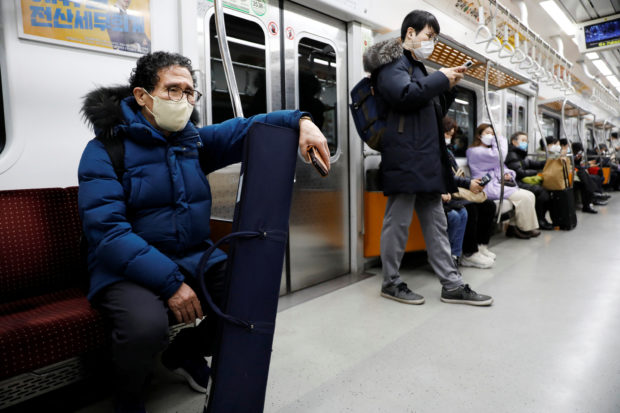
Park Gyung-sun, 71, rides on a subway to deliver a parcel in Seoul, South Korea, February 8, 2023. REUTERS
SEOUL — Every day, 71-year-old Park Gyung-sun delivers flowers, documents and other packages around Seoul – a job popular among senior citizens who are entitled to ride the city’s subways for free.
The work, dubbed “silver delivery” in South Korea, earns Park, a former market stall owner, up to 700,000 won ($550) a month. The company he works for is just one of two dozen in the capital.
“It’s fun and good for my health,” Park told Reuters. “But honestly, I wouldn’t be doing it if subway rides weren’t free because there wouldn’t be much left over for me.”
Free rides have been a perk enjoyed nationally by those 65 and older for four decades and are credited with keeping senior citizens active. They have, however, become a thorny political issue as South Korea’s population rapidly ages and subway operating costs soar.
There is no talk of doing away with the benefit altogether but some cities that operate subways are threatening steep fare hikes or a lifting of the eligible age unless the national government shoulders some of the cost. The finance ministry is staunchly opposed.
The dispute is part of broader challenges for Asia’s fourth-largest economy where the cost of senior welfare is surging and comes amid debate on raising the retirement age from 60 and how to ensure a sustainable national pension scheme.
It’s also left President Yoon Suk-yeol in a quandary. He promised fiscal consolidation upon taking office in May but also counts elderly voters as a key support base.
Consumers are already unhappy with inflation at 24-year highs, steep utility price hikes and an economy that in the last quarter posted its first contraction in more than two years.
Some members of his ruling People Power party have warned that any scaling back of subway perks for the elderly will not help their chances in next year’s parliamentary election – one where the party is seeking to retake a majority so Yoon can push forward with his reform agenda.
The free ride problem is set to only get worse over time.
More than 18% of South Korea’s population of 51 million is aged 65 or older. That proportion is projected to hit 30% in 2035 and 40% in 2050, according to the country’s statistics agency.
In the greater Seoul area, where almost 3.7 million people are 65 or older, more than 233 million free rides were taken last year. That cost Seoul Metro some 315 billion won ($250 million), equivalent to 30% of its debt.
To cope, Seoul unveiled plans in December to hike subway fares for the first time since 2015, by as much as 30%, although free rides for the elderly will remain in place.
Planned fare hikes could only be minimized if “there is at least some state assistance,” Mayor Oh Se-hoon told a news conference last week, noting the free ride policy had been imposed on cities by former military dictator Chun Doo-hwan in the early 1980s.
For its part, the finance ministry says it has funded building and improving subway systems, and the cities should handle operating costs.
“In the case of Seoul, they are in fact in a far more solid financial position than the country, and given that situation, I think it is a bit too much to ask the state to take responsibility for this,” Vice Finance Minister Bang Ki-sun told Reuters.
Daegu, a large city in South Korea’s southeast, said recently it will consider increasing the minimum eligible age in gradual stages to 70. Another city, Daejeon, is looking at a similar policy.
Sixty percent of Koreans support raising the minimum age for senior citizen benefits including free subway rides to 70, according to a Gallup poll released last week. Thirty-four percent were opposed.
The welfare ministry will review whether local governments are entitled to change minimum age eligibility levels, Yoon’s office said in response to a Reuters request for comment on the matter.
($1 = 1,282.8200 won)
RELATED STORIES